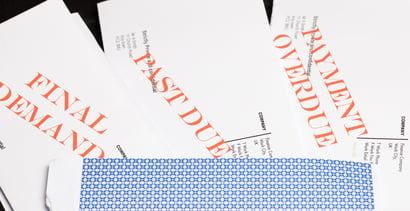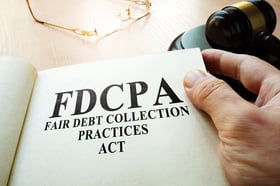

There’s something incredibly stressful about answering the phone to discover a debt collector is waiting for you on the other end of the line. Yet when you borrow money and don’t pay it back as you agreed, collection calls are something you are going to have to get used to receiving.
Or do you?
Believe it or not, you have the right to put a stop to debt collector calls if that’s something you want to do. And while the prospect of never picking up the phone to hear from another debt collector again might sound quite tempting, you may want to think twice before you put those calls to a halt. Stopping debt collector communication could potentially have some unintended consequences because you are forcing them to consider other methods to collect the debt.
The Fair Debt Collection Practices Act or, FDCPA
As annoying as debt collectors may seem, it helps to remember they’re just doing a job, albeit a rather unpleasant job. Think about it. Would you like to spend your day trying to track down people who have unpaid debts?
Thanks, but no thanks. Debt collection can certainly be a tough way to earn a living.

The Fair Debt Collection Practices Act helps protect consumers against abusive debt collection practices.
Granted, there are debt collectors who take things too far and become downright abusive. That’s why the Fair Debt Collection Practices Act was created in the first place. Enacted in 1977, the FDCPA helps to protect you and other consumers from abusive debt collection practices.
Thanks to the FDCPA, debt collection isn’t a free-for-all affair where debt collectors get to set the rules and do whatever they want to compel you to pay.
Instead, the FDCPA sets forth guidelines that collectors must follow when trying to collect a debt. Some of the more meaningful protections of the FDCPA allow a debt collector to:
- Call you and write you about your unpaid debt.
- Call you at work.
- Call your friends and family, but only once and only to ask for your contact information.
- Report information about your debt to the credit reporting agencies; Equifax, TransUnion, and Experian.
- Sue you and potentially garnish your wages, garnish your tax refund, or place a levy on your bank account if a judge allows it.
If a debt collector is not abiding by any of the above guidelines, you can submit a complaint with the Consumer Financial Protection Bureau (CFPB).
How to Stop Debt Collection Calls
Although debt collectors are allowed to call you, they can’t call you at all hours of the day and night. Calling in the middle of the night, for example, is off limits.

Collection calls are only allowed under the FDCPA between 8 a.m. and 9 p.m. in your local time zone.
Collection calls are only allowed under the FDCPA between 8:00 a.m. and 9:00 p.m., in your local time zone. If a debt collector calls outside of those hours, they are not following the law.
If a debt collector is calling you at work, the FDCPA lets you put a stop to that as well. You can inform a debt collector that you are not allowed to receive calls at work and that it must cease immediately.
Finally, you have the right to stop all communication, both calls and letters, from your debt collectors. The request must be sent to the debt collector in writing, and it’s probably best to send it certified mail, return receipt requested.
As always, there are exceptions to the rules. And even after you ask for communications to stop, there are two scenarios whereby a debt collector would still be legally allowed to contact you.
- A debt collector can contact you to let you know it is no longer attempting to collect the debt from you.
- You can be sent a notice that the collector intends to use other debt collection methods, such as a lawsuit.
Before you leverage your rights and demand that debt collectors stop contacting you, you should probably consider the alternatives.
Potential Consequences of Halting Communication
It is perfectly understandable why someone would want debt collection calls and letters to stop. Those calls and letters can be incredibly stressful and irritating. They can make you feel sick with worry when you can’t afford to pay your bills.
As mentioned, the FDCPA gives you the right to ask a debt collector to stop calling or writing to you. Yet as tempting as this may sound, requesting to halt communication from your debt collectors is not necessarily in your best interest.
Keep in mind that debt collectors have a job to do, which is to collect as many unpaid debts as possible. They do this by trying to compel you to pay through methods such as:
- Collection Calls and Letters
- Credit Reporting
- Lawsuits
- Wage Garnishment
When you take away a collector’s ability to contact you by phone or mail, you are only leaving that collector one more way to communicate with you about the debt. In other words, if you ask a debt collector to stop calling or writing to you, there is a chance the collector may file a lawsuit against you as an alternative.
The FDCPA Won’t Erase Debt or Protect You from Being Sued
According to the Urban Institute, a nonprofit research organization, 71 million adults in the United States have debt in collections. If you’re among those consumers, debts in collection can have a very real and negative impact on your life.
Collection accounts can lower your credit scores, make it harder to access affordable financing, and may even make it tougher to land a good job. The bottom line is, if you’re struggling with debt problems, you need to come up with a plan to change your situation for the better. This may include setting up a payment plan with the collector, offering a settlement, or considering bankruptcy.
None of these is a good option. But, they are certainly better than doing nothing and being served with lawsuit paperwork while you are trying to enjoy dinner.
This service of process cannot be ignored, and you don’t have any rights under the FDCPA to avoid being sued. And, if you do choose to ignore the fact that you’ve been sued, you will lose by default and the debt collector will now have a judgment to hold over your head.
Advertiser Disclosure
BadCredit.org is a free online resource that offers valuable content and comparison services to users. To keep this resource 100% free for users, we receive advertising compensation from the financial products listed on this page. Along with key review factors, this compensation may impact how and where products appear on the page (including, for example, the order in which they appear). BadCredit.org does not include listings for all financial products.
Our Editorial Review Policy
Our site is committed to publishing independent, accurate content guided by strict editorial guidelines. Before articles and reviews are published on our site, they undergo a thorough review process performed by a team of independent editors and subject-matter experts to ensure the content’s accuracy, timeliness, and impartiality. Our editorial team is separate and independent of our site’s advertisers, and the opinions they express on our site are their own. To read more about our team members and their editorial backgrounds, please visit our site’s About page.






